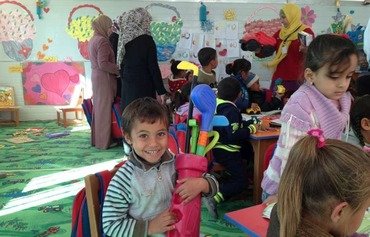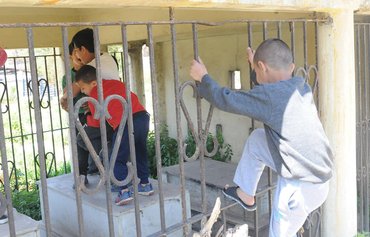With child labour and school dropouts on the rise in Jordan, the UN Children's Fund (UNICEF) has been implementing a project that aims to bring poor children in the kingdom back to school.
The "Hajati" (My Needs) cash transfer project aims to provide support to 100,000 marginalised and poor children to enable them to continue their education.
So far, the project has provided aid for a total of 53,333 children of different nationalities and from 19,609 households, according to a March 4th UNICEF report outlining the results of the project.
According to the report, Hajati helped 3,241 children return to school after they had to drop out.
The project allocates $28 per month for each child to cover basic needs like school transportation, uniform and stationery, according to the report.
The majority of the beneficiaries are Syrian refugee children, who make up 86% of the total, followed by Jordanians with 11%, and the rest are of other nationalities, the report said.
The project operates in 205 double-shift schools, which provide morning and afternoon classes.
Children between 6 and 11 years old have a high enrollment rate, but as they start growing, the rate drops for adolescents, said Social Protection Programme specialist Gabriele Erba, who is in charge of the project.
The project will be expanded, he said, and aims to help reduce child labor and the early marriage of girls.
"Even though we are experiencing difficult financial circumstances at UNICEF, we hope to reach [100,000 children] by the end of the year," Erba told Al-Mashareq.
Reducing illiteracy rates
Hajati targets children from grades 1 through 9 in the most vulnerable communities in Jordan, Erba said.
The programme contributes to lowering the illiteracy rates and percentage of children who are out of school through cash grants to increase enrollment, he said.
Families receive cash grants that cover transportation, basic school essentials, stationery, sanitary supplies and clothes that children need to go to school, he added.
"Poor families often resort to pulling their children out of school to work and earn money to help meet the needs of the family, thus increasing child labour," he said.
Some resort to marrying off their daughters at a young age, which increases early marriage rates, he said, noting that Hajati aims to tackle these issues by empowering families to send their children to school.
In addition to cash assistance, the programme provides psychological support, guidance and awareness-raising on the importance of education, Erba said.
Number of child workers on the rise
"Many families are unable to send their children to school because they face difficult economic circumstances, and as a consequence, child labour in Jordan is on the rise, as is the early marriage of girls," said sociology professor Hussein al-Khuzai.
The number of child workers in Jordan has now reached 100,000, he said, an increase from about 33,000 child workers before 2011.
"It is very important that the [UNICEF] initiative also works to educate families and not only provides them with financial support," he told Al-Mashareq.
"We all have to support this creative initiative, which will make a difference in building an educated generation with a future to look forward to," he said.

![A UNICEF project in Jordan has helped 3,241 children return to school after they had to drop out. [Photo courtesy of UNICEF Jordan]](/cnmi_am/images/2018/03/16/11890-jordan-hajati-beneficiaries-600_384.jpg)







I urgently need help, but you've given nothing.
Reply2 Comment(s)
We may ignore other needs, like clothes and food, but we shouldn’t ignore education, especially for tomorrow’s children. The incentives for criminality and terrorism in our time have become easy and available. We always seek to increase numbers, whether among Jordanians or other nationalities, so we may lower the level of illiteracy in our blessed country, Jordan. It’s a pleasure to support this project with all that I have. We should pay attention that the level of education be not than the level of education of government school.
Reply2 Comment(s)